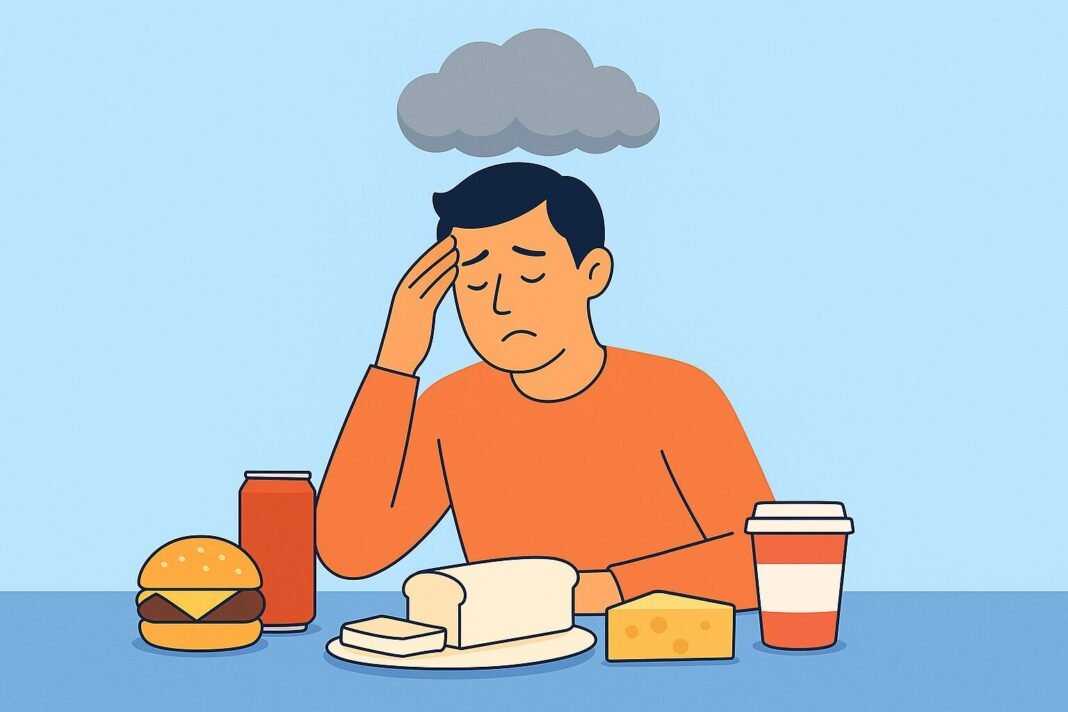Table of Contents
Ever feel mentally foggy after lunch or hit a wall by 3PM?
Brain Fog Foods. You’re not imagining it. The foods you eat may be contributing more to your focus—or your fuzziness—than you think. This article explores a powerful and often overlooked cause of brain fog foods: your diet.
Let’s break down why what’s on your plate could be clouding your thinking—and how to eat for mental clarity instead.
Why Brain Fog Foods Matters
Food doesn’t just fuel your body—it directly impacts your brain. When your diet is out of balance, it can trigger blood sugar crashes, inflammation, sluggish neurotransmitters, and more. All of which quietly erode your focus and energy.
Most people know to “eat healthy,” but don’t realize that even common, convenient meals (like a bagel and coffee or an energy drink with chips) can feel okay in the moment—then lead to a foggy mind later.
That’s why identifying and changing just a few brain fog foods can make a noticeable difference in your mental clarity.
Signs This May Be Affecting You
Wondering if your food habits are dragging your brain down? Here are a few signals:
- You feel groggy, distracted, or sluggish within 1–2 hours after eating
- You crave sugar, caffeine, or snacks constantly through the day
- You forget simple things more often (names, tabs you just opened)
- You struggle to focus for more than 20 minutes at a time
- You get “hangry” or irritable if meals are delayed
The Connection Between Diet and Brain Fog
Here’s what’s going on behind the scenes:
Your brain needs steady energy to think clearly. That energy comes mostly from glucose (blood sugar)—but when your meals are high in refined carbs or sugars (think white bread, soda, candy), it causes a spike and crash effect.
The spike may give you a short-term boost, but the crash leaves you foggy, tired, and unfocused.
Chronic inflammation also plays a role. Some foods (like processed oils or artificial additives) may promote low-grade inflammation in the body and brain, which researchers have linked to cognitive fatigue and slow thinking.
Lastly, diets low in key nutrients like omega-3s, magnesium, or B vitamins may deprive the brain of what it needs to produce neurotransmitters like dopamine and serotonin—chemicals that affect mood, motivation, and mental sharpness.
What You Can Do About It
Here are a few clarity-boosting changes you can make—without doing a full meal overhaul:
1. Swap Simple Carbs for Complex Ones
Instead of white rice or bread, choose oats, quinoa, or sweet potatoes. These digest more slowly, giving your brain longer-lasting energy.
2. Add Protein to Every Meal
Eggs, Greek yogurt, tofu, fish, nuts, and seeds help stabilize blood sugar and reduce mid-day brain crashes.
3. Hydrate Early and Often
Mild dehydration can lead to foggy thinking—especially in the morning. Start your day with water (add a pinch of salt or lemon for better absorption).
4. Limit Sugar + Caffeine Combos
Pastries and energy drinks may feel helpful short term, but often lead to energy dips. Try tea with nuts or dark chocolate instead.
5. Include Brain-Friendly Fats
Avocados, olive oil, and salmon help build healthy brain cells and reduce inflammation.
Brain Fog Triggers vs. Clear Mind Foods
| Fog Trigger | Alternative | Why It Helps |
|---|---|---|
| White bread | Oats + berries | Provides steady glucose supply |
| Soda | Herbal tea + lemon | Avoids crashes and jitters |
| Skipping meals | Small protein snacks | Keeps brain energy steady |
| Energy drinks | Black coffee + water | Reduces jitter-crash effect |
| Candy or pastries | Fruit + nut butter | Natural sugar + fat = stability |
Final Thoughts
You don’t need to change everything. Even small shifts—like swapping soda for tea or adding protein to breakfast—can make your brain feel more stable, energized, and clear.
Try one change this week. See how your brain responds in just 3–5 days.
Want more daily mental clarity tips?
Subscribe to Daily Mind Boost.
Need a full reset?
Read next: What Is Brain Fog? Symptoms, Causes & How to Clear It





